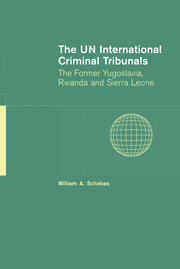Book contents
- Frontmatter
- Contents
- Preface
- Table of cases
- Table of legislative provisions
- List of abbreviations
- PART I Establishment of the tribunals
- 1 Creation of the tribunals
- 2 The legitimacy and legality of the tribunals
- 3 Sources of law
- PART II Jurisdiction
- PART III Substantive and procedural aspects of prosecution
- PART IV Organisation of the tribunals
- Bibliography
- Index
2 - The legitimacy and legality of the tribunals
Published online by Cambridge University Press: 05 June 2012
- Frontmatter
- Contents
- Preface
- Table of cases
- Table of legislative provisions
- List of abbreviations
- PART I Establishment of the tribunals
- 1 Creation of the tribunals
- 2 The legitimacy and legality of the tribunals
- 3 Sources of law
- PART II Jurisdiction
- PART III Substantive and procedural aspects of prosecution
- PART IV Organisation of the tribunals
- Bibliography
- Index
Summary
In a celebrated passage from its ruling in the Yerodia case, dealing with immunity to criminal prosecution, the International Court of Justice (ICJ) stated that while a head of State could not be prosecuted by the national courts of another State, he or she was subject to prosecution by ‘certain international criminal courts’. The Court said that
an incumbent or former Minister for Foreign Affairs may be subject to criminal proceedings before certain international criminal courts, where they have jurisdiction. Examples include the International Criminal Tribunal for the former Yugoslavia, and the International Criminal Tribunal for Rwanda, established pursuant to Security Council resolutions under Chapter VII of the United Nations Charter, and the future International Criminal Court created by the 1998 Rome Convention. The latter's Statute expressly provides, in Article 27, paragraph 2, that ‘[i]mmunities or special procedural rules which may attach to the official capacity of a person, whether under national or international law, shall not bar the Court from exercising its jurisdiction over such a person’.
The Court distinguished this case from that of prosecution before what it described, in the same paragraph, as ‘foreign jurisdiction’ or, alternatively, a ‘court of one State’. The ICJ did not elaborate on the criteria for determining how to distinguish between ‘international courts’ and ‘national courts’. But there can be no doubt that it recognised the distinction between the two types of bodies and that it also, at least indirectly, pronounced itself on the legality of the institutions.
- Type
- Chapter
- Information
- The UN International Criminal TribunalsThe Former Yugoslavia, Rwanda and Sierra Leone, pp. 47 - 73Publisher: Cambridge University PressPrint publication year: 2006



